Share
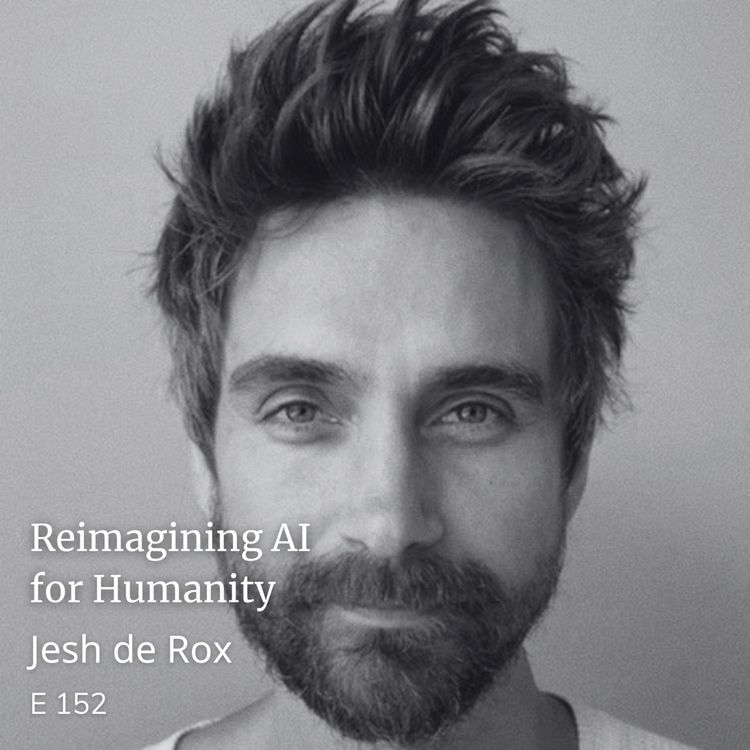
Corporate Unplugged
Reimagining AI for Human Growth
In this episode of Corporate Unplugged, Vesna explores new worlds with Jesh de Rox, cultural anthropologist and founder of hOURS. They explore the transformative potential of AI in enhancing human connection and creativity. Jesh shares his journey from being a renowned photographer to a visionary leader in social technology, emphasizing the importance of nurturing environments that foster human growth.
Jesh discusses his shift from seeing himself as a healer to a gardener, focusing on creating conditions for people to thrive. This metaphor underpins his work at hOURS, where he aims to build scalable systems that promote epiphanies and personal development. He envisions a future where technology supports collective intelligence, drawing from the deep well of human creativity and emotion.
The conversation also touches on the limitations of current AI systems, which often lack depth and fail to capture the richness of human experience. Jesh advocates for a new approach that respects individual data ownership and incentivizes genuine contributions to a collective intelligence network.
This episode reflects on the role of trust and purpose in this journey, highlighting the urgent need for businesses to align with human-centric values. It is a call for leaders to embrace boldness and authenticity in shaping a future that prioritizes growth and connection over profit and exploitation.
In this episode:
- Transitioning from healing wounds to cultivating growth.
- AI that can enhance human creativity and connection.
- Personal data ownership – crucial for ethical AI development.
- Trust and purpose – essential components of systems aligned with human values.
- A call for leaders to prioritize meaningful contributions over profit.
More episodes
View all episodes
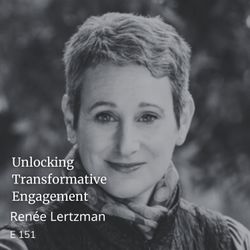
151. Unlocking Transformative Engagement
41:03||Season 2, Ep. 151In this episode Vesna sits down with Dr. Renée Lertzman, a renowned psychologist and strategist, to explore the intricacies of creating genuine engagement within organizations. Renée shares her insights on leveraging psychology to drive transformative change and how leaders can foster resilience in the face of volatility.She emphasizes the importance of intrinsic motivation, highlighting key drivers like mastery, purpose, autonomy, connection, and belonging. This challenges traditional approaches to change management, advocating for a shift from pushing and persuading to guiding and partnering with teams.The conversation delves into the psychological aspects of courage and how organizations can create environments that enable individuals to access their inner strength. Dr. Lertzman also discusses the significance of integrating experiences into daily practice, ensuring that transformative moments lead to sustainable change.Join us as we uncover strategies for unlocking potential and driving meaningful change in today's complex world.On today’s podcast :Intrinsic Motivation: Mastery, purpose, autonomy, connection, and belonging.Guiding Over Pushing: Shift from traditional methods to a partnership approach in leadership.Courage and Resilience: Creating conditions that enable individuals to access their courage.Integration of Experiences: Ensuring transformative experiences are integrated into everyday practice.Psychological Approach: Using psychology to foster engagement and manage change effectively.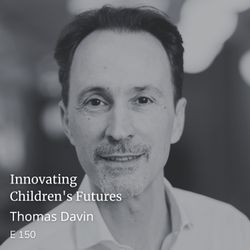
150. Innovating Children's Futures
32:41||Season 2, Ep. 150Thomas Davin is the Global Innovation Director at UNICEF. With over two decades of experience in international development and humanitarian work, in this episode of Corporate Unplugged Thomas shares his insights on leveraging innovation to address global challenges affecting children.He emphasizes the critical role of young people as active contributors to climate innovation and highlights UNICEF's efforts to empower youth through initiatives like climate accelerators, which support young innovators in developing impactful solutions. UNICEF's strategic approach to identifying and scaling innovative solutions has stretched to cover 160 countries. Thomas explains how his team identifies key problems affecting children, such as the learning crisis where a significant percentage of children cannot comprehend texts they read. By vetting and adopting successful solutions from various regions, UNICEF aims to address these challenges effectively.Thomas discusses the importance of building future leaders through programs like Upshift, which equips young people with skills in critical thinking and problem-solving. This initiative has reached over 1.5 million adolescents globally, fostering a generation of adaptable and innovative thinkers poised to shape the future.Throughout the episode, Thomas reflects on the power of collaboration and co-creation in solving complex global problems. He underscores the need for bold thinking and unlearning conventional approaches to drive meaningful change.Thomas powerfully expresses his passion for social justice and his vision for a future where every child has equal opportunities for quality education and health. He advocates for hope and empathy as essential elements in addressing global challenges and building a more equitable world.In this episode: UNICEF's focus on accelerating impact for children globally through innovative solutions.Identifying key problems, vetting solutions, and facilitating adoption and scaling of effective interventions.Importance of storytelling and highlighting successful local examples to inspire replication.UNICEF's "Upshifts" curriculum empowering young entrepreneurs and changemakers.Co-creation and "unlearning" as powerful tools to unlock new perspectives.Thomas's personal commitment to social justice and equal opportunities for all children.Advice to leaders on being bold, daring, and continuously challenging themselves and their teams.
149. The Alchemy of Vibration and Music
48:48||Season 2, Ep. 149"Everything vibrates. So every cell of your body right now is vibrating and has its own frequency." In this episode of the Corporate Unplugged podcast, Vesna ventures into sound with renowned multi-instrumentalist, and multimedia producer Laura Inserra. Laura shares her personal insights as a ‘Sound Alchemist’ on the vibrational essence of the universe and the profound healing power of music.Laura explains how music can entrain the body's natural frequencies, releasing stagnant energies and emotions. She describes her personal journey of discovering her musical gifts, and the transformative mentors and experiences that have shaped her work, culminating in her immersive ‘Chambers of Awe’ experiences that combine ancient instruments with cutting-edge technology to guide participants on journeys of expanded consciousness.Looking towards the future, she emphasizes the importance of flexible, caring leadership that empowers people's unique talents and contributions.In this podcast:● The vibrational nature of the universe and how it is understood across diverse spiritual and philosophical traditions● Laura’s work creating immersive ‘Chambers of Awe’ experiences● The healing power of music to entrain the body's natural frequencies and release stagnant energies● Laura’s personal journey of discovering her musical talents and the mentors who shaped her work● The importance of leadership that empowers people's unique gifts and fosters a cooperative, nature-inspired model● Laura’s vision for a future where humanity learns from nature's collaborative approach, using technology to augment human abilities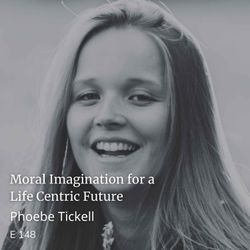
148. Moral Imagination for a Life Centric Future
41:15||Season 2, Ep. 148Phoebe Tickell is a renegade scientist, systems thinker, and social entrepreneur that sums her work up as an ‘‘imagination activist’. In this episode, Vesna and Phoebe discuss the critical role of creativity and perception in shaping the world around us. We delve into the challenges of fostering imagination and creativity within organizations, highlighting the need for psychological safety, non-hierarchical work environments, and interventions that integrate art and creativity into leadership and decision-making. Phoebe shares her personal journey from the world of science and technology to the realm of moral imagination, driven by a desire to address societal issues at a deeper level.She envisions a future where living on Earth is safe, free, and abundant, with restored ecosystems and a life-centric economy. This important discussion explores the potential for organizations to become instruments of change, prioritizing people's well-being and the planet's health over traditional metrics of success. On this podcast with Phoebe Tickell you will hear about:The power of moral imagination in shaping the world and driving collective action.The importance of acknowledging the full spectrum of emotions, including our shadow sides, to create more textured and life-affirming futures.Strategies for building work environments that nurture creativity and innovation, such as fostering psychological safety and non-hierarchical structures.Phoebe’s personal journey from the world of science to the realm of moral imagination, driven by a desire to address societal issues at a deeper level.The potential for organizations to become instruments of change, prioritizing people's well-being and the planet's health over traditional metrics of success.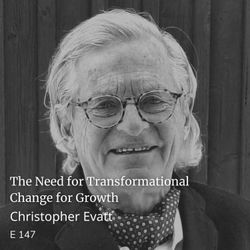
147. The Need for Transformational Change for Growth
44:27||Season 2, Ep. 147New Zealand born business philosopher and entrepreneur, Christopher Evatt, was raised with the understanding that we should leave everybody and everything better than when we found it, and we should work for the good of the whole. But the problem is, we humans have been labouring under an illusion of separation, both individually and collectively. We’re all connected, says Christopher, our society, companies, organisations, the planet; we’re all one living system.In this episode of Corporate Unplugged, Christopher discusses our need to evolve and grow, to raise our consciousness and understanding of our interconnectedness, both within individuals and organisations. But more importantly, we need to learn to clear our own energy system, to embrace the power of thought, intention, and beliefs to make wise choices and grow in wisdom.To learn more, download and listen to this episode today. On today’s podcast:● Personal growth, collective dysfunction, and planetary transformation● Consciousness, growth, and personal development● Bridging generations for business success● Businesses need a quantum understanding to thrive● We are all leaders
146. How To Become What You Might Have Been
31:07||Season 2, Ep. 146Don’t stress about where you are in life, says Eda Çarmıklı, a proud utopian and firm believer, that it’s never too late to become what you might have been. You're going to get to where you need to be, or perhaps you’re already there. Just open your eyes and trust that life will bring you the right people, the right communities, and the right collaborations, when you’re ready. Eda’s the co-founder of the global collaborative platform, Joint Idea; lifelong laboratory growth program Life Works Labs; and social tribe, Love Mafia. She’s also a second generation shareholder in Nurol Holding, an industrial conglomerate in Turkey operating in construction, infrastructure, machinery, energy, investment, banking and tourism. In this episode of Corporate Unplugged, Eda talks about the hurdles life presents us so that we can become what we were meant to be. “Just flow and see where life takes you. Don’t force things, don’t try to wear jackets that don’t fit you, just let it go and enjoy life as it is; just trust life that it may not deliver you what you want, but exactly what you need.” On today’s podcast: ● Personal growth, vulnerability, and utopia● Learn to voice your truth● Leadership, growth, and sustainability in a family-owned business● Exponential humanity and learning to listen● Collective intelligence, love, and compassion in business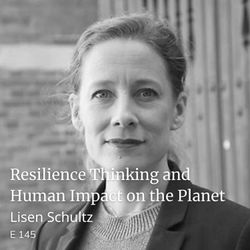
145. Resilience Thinking and Human Impact on the Planet
40:31||Season 2, Ep. 145We all depend on Planet Earth for life and yet as a species, our collective actions are having devastating impacts such as a loss of biodiversity and climate change, among other things. It’s literally the definition of insanity, says Lisen Schultz, Associate Professor in Sustainability Science, Deputy Director for the Stockholm Resilience Center, University of Stockholm, Director of Education, and the Programme Director for the center's executive programme in resilience thinking. We humans aren’t evil, our problem is we don’t see what we’re doing as damaging, nor can we see how we could do it differently. Our world is built around a formula of growth, rather than meaningful growth. In this episode of Corporate Unplugged, Lisen discusses the urgency of the climate change challenge, but also the potential opportunities it presents for us individually, as well as for companies, but, in a way that doesn’t create a whole new set of problems. To find out more, download and listen to this fascinating conversation. On today’s podcast:Climate change impact and human warmingSustainable business practices Sustainability transition and its benefits for societyClimate action and hope for the future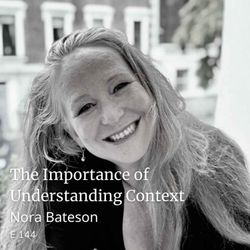
144. The Importance of Understanding Context
38:22||Season 2, Ep. 144There is a real pressure to solve the climate crisis and the myriad other environmental and social issues by breaking them down into their constituent parts, to solve them individually. But, says Nora Bateson, award-winning filmmaker, writer and educator, and President of the International Bateson Institute, this approach is the biggest challenge we need to overcome. We live in a complex, interdependent world, and to find new solutions we need to relearn how we think, feel and navigate, we need to adopt a different mindset. In this episode of Corporate Unplugged, Vesna and Nora discuss the need for a more diverse ecology of knowing; how do we know things? What is our ability to zoom in and study the details? And how can we zoom out and see the context?To find out more, download and listen to this latest episode. On today’s podcast:The perception habits we need to ditchWe have to learn to do things togetherWhat is this warm data stuff?The future Nora wants to see